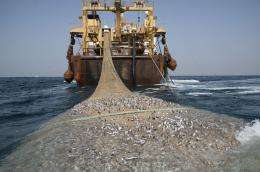A sea of broken promises: Avoiding empty ocean commitments at Rio+20

RIO: World leaders have made pitiful progress on their guarantee to protect global oceans from overfishing and other threats. In a paper published today (June 15, 2012) in Science, the Zoological Society of London (ZSL) and world renowned researchers have reviewed commitments made by governments to protect the world's oceans and shown that there has been little success over the past 20 years.
At the World Summit on Sustainable Development in 2002, heads of 192 governments came together to agree on key issues - including targets for protecting vulnerable species and marine habitats and managing fishing sustainably in national waters. Ten years on, none of these targets have been met, and in some cases the situation is worse than before.
Professor Jonathan Baillie, Director of Conservation at ZSL, says: "Our analysis shows that almost every commitment made by governments to protect the oceans has not been achieved. If these international processes are to be taken seriously, governments must be held accountable and any future commitments must come with clear plans for implementation and a process to evaluate success or failure.''
Global depletion of fish stocks is threatening the integrity of ocean ecosystems. Risks posed by climate change, disease, and other pressures will have a huge impact on ecosystems already destabilized by overfishing, pollution, and other damaging activities. Collapses such as the Newfoundland cod fishery – once the largest in the world – came as a complete surprise to most people and has not recovered in the 20 years since the population crashed.
But a few areas have seen improvement. The recent creation of very large marine reserves around remote islands such as the Chagos Archipelago, the Northwestern Hawaiian Islands and South Orkney Islands is encouraging, and there have been improvements to the fishing gear used in some areas to reduce their impact on seabird populations. In general, however, the situation remains critical, and there is little or no protection for vulnerable marine habitats which continue to be fished in destructive ways.
ZSL's Marine Policy Officer Liane Veitch says: "There are large scale changes occurring in the oceans that weren't known to be a problem in 1992 or 2002, such as ocean acidification or mass coral bleaching, which we now know will make sustainable ocean management even more challenging. Rio+20 might be our last real chance to save ocean ecosystems and make sure we can manage marine fish stocks in a sustainable way."
Conservationists from ZSL will be in Brazil at Rio+20, encouraging governments to engage with policy makers to make a difference to our oceans. As part of the Marine Reserves Coalition, they will be hosting an oceans side event, as well as presenting the Pledge for a Better Planet to global legislators, asking them to sign a contract with the youth of today to commit to improving management of the world's resources.
More information: "Avoiding Empty Ocean Commitments at Rio+20," by L. Veitch, Science, 2012.
Journal information: Science
Provided by Zoological Society of London
















